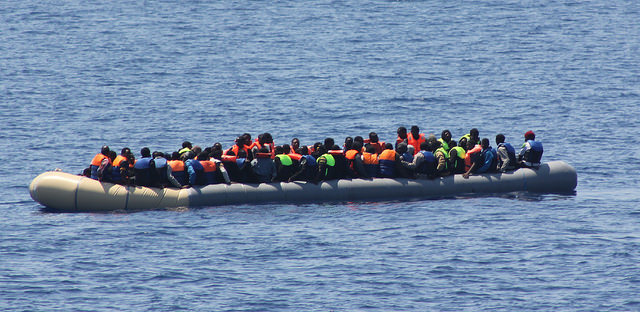On the 9th of October the United Nations Security Council authorised under Chapter VII of the UN Charter that Member States use proportionate measures to search, seize and dispose of vessels that are “smuggling migrants and trafficking persons” across the Mediterranean Sea. Resolution 2240 was intended to authorise ‘Operation Sophia’, phase two of a three-phase joint security and defence naval operation of EUNAVFOR-Med. This is the latest in a series of EU-sponsored measures to stop organised criminal networks profiting from the plight of hundreds of thousands of asylum seekers, refugees and migrants attempting to reach Europe through Libya.
The responsibilities and powers enshrined in Chapter VII of the UN Charter are central to the UN Security Council’s ability to uphold international stability and peace by averting or ending conflicts. Even as intractable multi-year conflicts such as that waging in Syria come before the Council, it has found itself unable to act on account of China and Russia’s age-old protection of state sovereignty along with fears that the catastrophic failures of military incursions into Iraq and Afghanistan will be repeated.
Given this history, the passage of Resolution 2240 was a surprise. But on a closer reading, it became apparent that this was only because: a) it has no impact on Libyan state sovereignty; b) it absolved no states of going to war with one another; and c) it goes towards tackling international crimes that the world has little or no idea how to tackle. The war being fought is one against smugglers and traffickers. The battlefield is the high seas. In fact, Operation Sophia was launched two days before the resolution was passed, clearly evidencing that the resolution was intended as a mere safeguard for what would have been carried out regardless.
As it turns out, Resolution 2240 was a non-event from the outset. In its first three weeks, Operation Sophia has not seized any vessels or made any arrests. And although states acknowledged that the text of this resolution—namely to search, seize and dispose of vessels used in smuggling or trafficking crimes—addresses only a small part of the crisis confronting Europe today, Resolution 2240 forgets that the people floating on rubber dinghies off the coast of Libya are typically not criminals. Rather, they are vulnerable migrants, refugees or asylum seekers, sent adrift at sea while the real perpetrators wave back at them from the safety of Libya’s sandy white beaches.
Second, it appears that for the most part, what is happening off the coast of Libya is people smuggling with criminal abuse rather than trafficking. The two terms are packaged by Resolution 2240 in such a way as to make out that they go hand in hand and that both warrant a Chapter VII response. Smuggling is in fact, the consensual and illegal movement of a person across an international border for a material or other benefit. Trafficking is the forcible, fraudulent or otherwise deceptive harbour, receipt or transfer of a person for the purpose of exploiting them for prostitution, forced labour or other slave-like practices.
While smuggling may turn into trafficking as exploitation ensues, these crimes are different and deserve proportionate and distinct responses. For those who lack documentation and face increasingly tight border controls, people smugglers, despite their criminality, are often the only means to reaching safety. According to the Meijers Committee, people smuggling, even of the scale witnessed today, would not constitute a threat to ‘international peace and security’ as to warrant a Chapter VII resolution. “Although the Security Council has previously adopted such resolutions in response to refugee crises in Iraq and Haiti”, the committee said, “these were intended to stabilise the countries of origin and not to prevent persons from seeking refuge elsewhere.” As for targeting traffickers, if Operation Sophia cannot enter Libyan territorial waters to somehow determine that the elements of this crime are taking place, then it might as well continue to focus on search and rescue instead.
Although refugees from the Horn and Sub-Saharan Africa still continue to cross Libya in order to reach Europe, it is no longer the most popular way in to Europe. The route from Turkey to Greece is shorter. It is now the preferred route for almost 70 per cent of all migrants, asylum seekers and refugees. Yet while Europe has acted by actively participating in a dialogue with Turkey to try and prevent persons crossing, it has chosen a seemingly more hostile approach to the less-used Libyan route.
If people smuggling and human trafficking are truly to be tackled, they require a comprehensive approach that features an enduring political solution for Libya, an end to endemic corruption and the eradication of the need for persons to move in an irregular and thus dangerous manner in search of safety. What it certainly does not need, is the consensual reframing of search and rescue as fighting crime instead so as to warrant a military response under a Chapter VII resolution of the UN Security Council.








